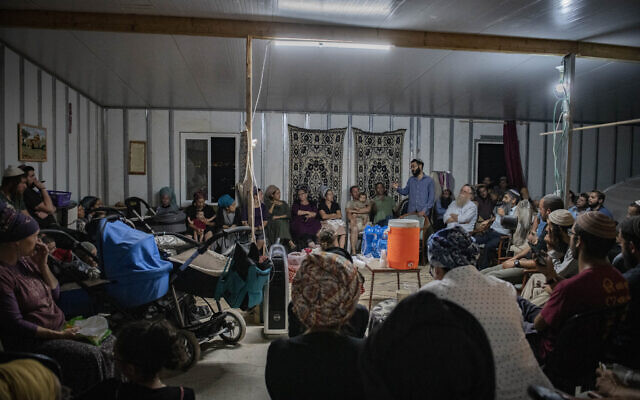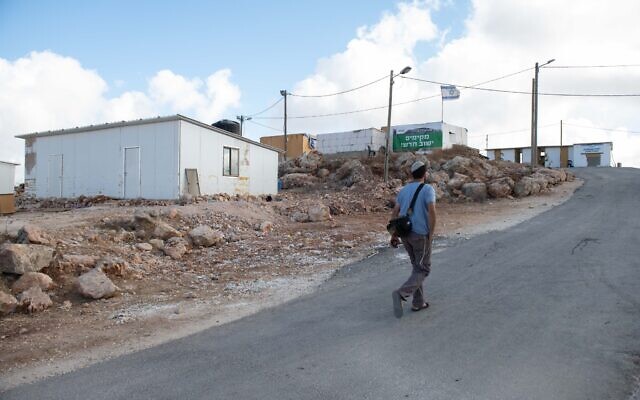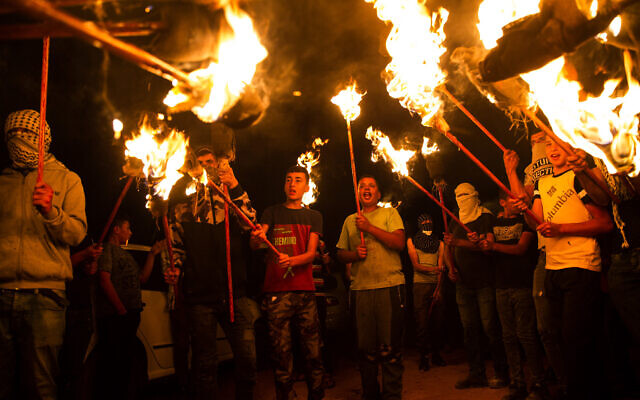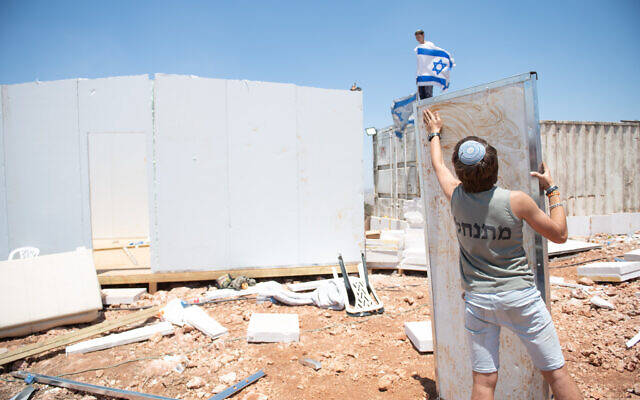Residents of an illegal West Bank outpost gave final approval on Wednesday morning to a deal with the government that would see them move off West Bank hilltops but retain some wildcat settlement.
The settlement came hours after questions were raised about claims settled a day earlier between the dozens of families living at the site and the government.
According to the settler leaders, under the new deal, a yeshiva would be established at the site only in several months, and not on August 9, as stipulated in an earlier deal detailed by the outpost’s leadership.
However, he said the deal would require the Defense Ministry to complete a survey of the land within six months, allowing settlement construction on parts of the tract not found to be encroaching upon privately-owned Palestinian plots.
The Samaria Regional Council announced the settlers’ approval for the final deal after midnight on Wednesday morning. There was no immediate confirmation from the civil administration of the Defense Ministry, which manages Israeli and Palestinian civil affairs in Area C of the West Bank.
Receive the daily edition of The Times of Israel by email and never miss our top stories
free Sign Up
It came after what Army Radio described as a stormy meeting that lasted into the night, with some opposing the agreement that they would leave their homes by the end of the week, with no guarantee that they would be able to return. will be allowed.

Aviatar settlers attend a meeting regarding a settlement agreement to prevent the outpost’s collapse on June 29, 2021. (Sraya Diamant/Flash90)
The Samaria Regional Council said that under the deal, residents of Avyatar would leave, but its structure would not be demolished, instead Israel Defense Forces immediately converted the outpost into a temporary military base.
On Tuesday, Bezel Smotrich, the head of the opposition religious Zionism party, accused the government of backtracking on an “understanding” that he said would have allowed a continued civilian presence at the site. He urged residents to reject any changes.
Yossi Degan, the head of the Samaria Regional Council, defended the agreement as necessary social rifts. “Any move towards the other side is for the unity of the people of Israel during these difficult times of division,” he said in a statement early Wednesday.
Religious Zionism mk Orit Strok dismissed Dagon’s argument as a “shameful” excuse and said that the “retraction and erosion from the agreement” was “worrisome”.
It was not immediately clear when Yeshiva would form under the explicit agreement. According to reports, Defense Minister Benny Gantz gave permission for Yeshiva to be located at the outpost before land surveys determined that the settlers could build under Israeli law.
Such surveys could take years to complete, but settlers supported by Smotrich sought to limit the ministry to just six months to complete the study.

Residents are seen at an illegal Ivyatar outpost in the northern West Bank on June 16, 2021. (Saraya Diamond/Flash 90)
On Monday, the Samaria Regional Council claimed that the deal was backed by Prime Minister Naftali Bennett, as well as Gantz and Interior Minister Aylett Shek.
Bennett, a former settler who leads the right-wing Yamina Party, was Sunday reported To be keen to avoid the spectacle of removing the post under his leadership, especially given the current political situation in which the coalition is struggling to maintain a majority in the Knesset.
There has been no confirmation of the terms of the deal with Bennett, Gantz or Sheik.
MPs, mainly from the Arab Joint List party, rejected the first proposal as “settlement and legalization of crime”.
Most of the international community considers all Israeli settlements in the West Bank illegal, but Israeli law distinguishes between settlements permitted by the Defense Ministry and checkpoints established without permission, usually by ideologically motivated youth. Many settlements began life as illegal outposts and only gained retrospective government approval after reaching a significant mass of residents.

Palestinians protest against the Aviatar outpost in the nearby Beta village, in the northern West Bank, on June 27, 2021. (Nasir Ishtayeh/Flash 90)
Avyatar, located on land south of Nablus, which Palestinians say has traditionally worked but was barred from reaching by the IDF, began in early May following a deadly shooting attack at nearby Tapua Junction. it was done. Earlier iterations of the outpost have been razed several times since the Israelis first attempted to settle the site in 2013.
The civil administration says it has not determined whose land belongs to whom. According to West Bank property laws, barren land can be returned to public ownership.
The outpost has grown rapidly over the past two months, swelling about 50 mobile homes and other temporary structures housing dozens of families. Its Facebook page claims that Avyatar prevents proximity between nearby Palestinian villages, while connecting the Israeli settlement of Tapua to Zatara Junction and the Migdalim settlement.

Jews are seen at the illegal Israeli outpost of Avyatar in the West Bank on June 28, 2021. (Flash90)
The population swelled further this week as right-wing youth camped at the site and prepared to protest the evacuation.
The area near the checkpoint has seen repeated clashes in recent weeks as Palestinians protested the construction of the outpost, in some cases throwing stones at soldiers and burning the ground. Israeli troops have responded with rioting ammunition and, in some cases, live bullets, killing four Palestinians.